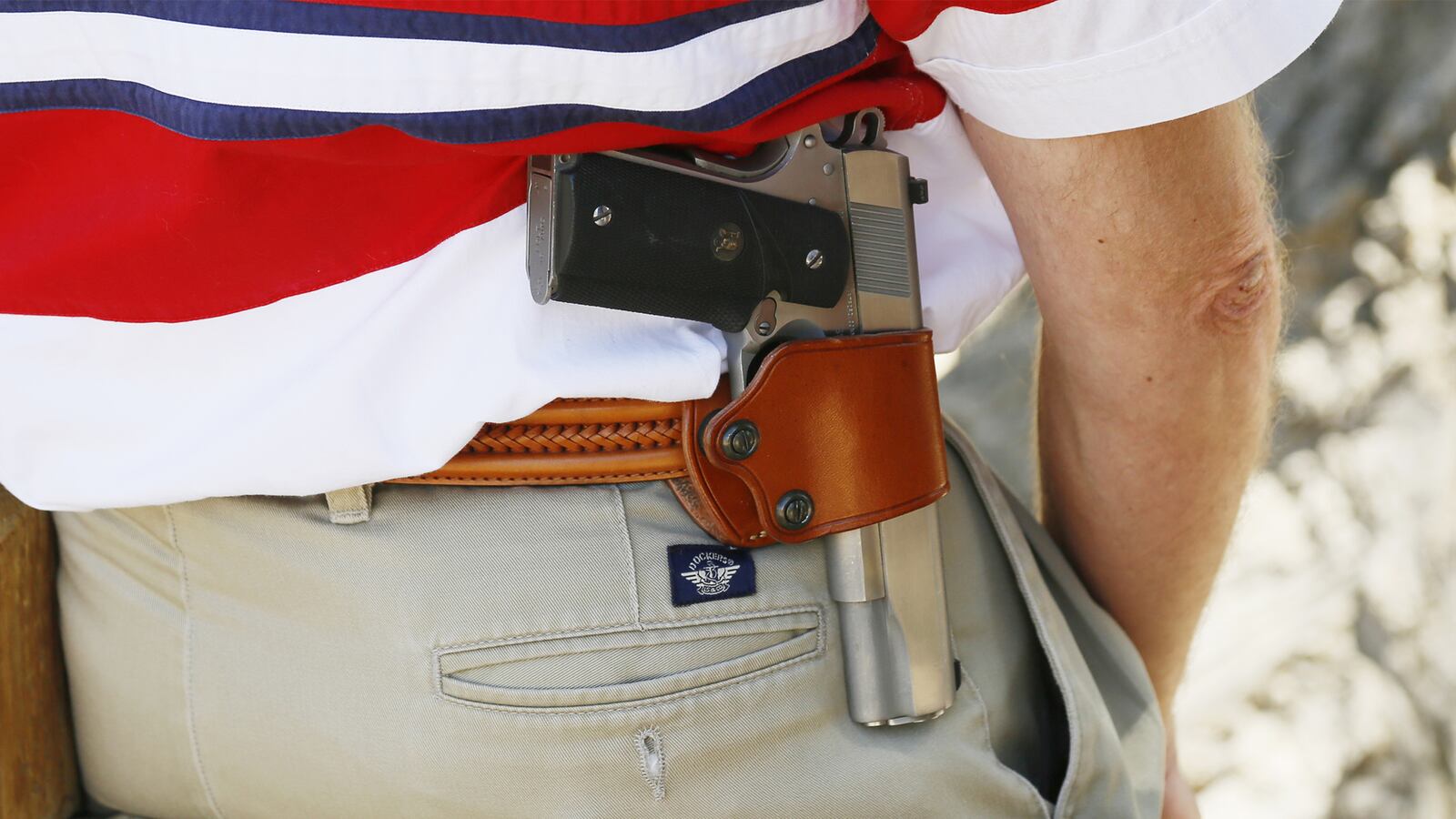Last Thursday, President Obama instituted a series of executive actions aimed at tightening gun control, including closing the so-called “gun show loophole” that provides a means for some private buyers to circumvent background checks.
By law, America's roughly 130,000 federally licensed firearms dealers are required to submit information on all prospective buyers through the National Instant Criminal Background Check System (NICS).
The system, which is administered by the FBI, blocks prospective gun buyers who fall into 12 categories of “prohibited persons” that the government contends are most likely to commit acts of violence. Anyone who qualifies found to be in possession of a firearm is guilty of a felony.
Gun-control advocates have called expanding this mandate to include small, private sellers “the single most important gun violence prevention measure that the government could adopt.”
In principle, the idea of a barrier preventing dangerous individuals from getting their hands on a firearm sounds like good policy.
In practice, however, NICS has operated largely as a blunt-force instrument influenced by decades of criminal justice policies that are statistically proven to single out minorities for heightened scrutiny.
More than half of the roughly 1.3 million prospective gun buyers flagged by NICS since it went operational in 1998 (or nearly 700,000 people) were disqualified for having been convicted of a crime punishable by more than one year in prison. The vast majority of these crimes are felonies.
Another 110,000 are barred from gun ownership because they are users of illicit drugs.
No doubt, some of these people present a threat to public safety. Since the FBI doesn’t publish data on the criminal histories of prohibited persons flagged by NICS, however, just how many is anyone’s guess.
What’s indisputable is that the number of Americans who would be prohibited from purchasing a firearm has grown considerably under the War on Drugs, and a disproportionate number of them are African Americans charged with nonviolent offenses.
Four years after the Gun Control Act of 1968 (GCA) banned felons and drug users from legally purchasing a firearm, New York passed the most draconian collection of drug laws in U.S. history. The Rockefeller Drug Laws became a national model for a growing war on drugs that centered almost exclusively on America’s minority communities.
Even a single drug arrest can lead to a lifetime prohibition on gun ownership. For example, a first-time conviction for distributing any amount of marijuana, or merely possessing harder drugs like heroin, carries a maximum penalty of more than five years in prison in some states.
Tens of thousands of African-American men have been disproportionately prosecuted under the patently racist “crack disparity”—which until 2010 treated one gram of cocaine base as the equivalent of 100 grams of powder.
Today, black Americans are far more likely than whites to be arrested, prosecuted and imprisoned for drug crimes. And they’re more likely to have the book thrown at them by prosecutors, juries, and judges. As a result, African Americans are incarcerated at six times the rate of their white peers. If we control simply for drug offenses the disparity between black and white imprisonment rates rises to 10 to 1.
According to one report, a third of the 24.5 million people arrested for drug offenses between 1980 and 2007 were African Americans (who comprise just 13 percent of the U.S. population).
In one city alone, San Francisco, felony drugs arrest rates for black Americans rose by 54 percent during the 1990s, even while arrest rates for other races fell.
Depending on state law, not even a full pardon may be enough to restore a former offender’s gun rights.
The real-world consequences, even without a trial, of this disparity can be stunning. Last year in Florida—where African-American adults are 35 percent more likely than white adults with a similar crime record to have a felony record—a 62-year-old African-American man was tackled to the ground by two white men in a Walmart. His crime? Legally carrying a handgun.
A recent Pew poll found a sharp increase in the number of African Americans who say they support gun rights. Yet blacks are less than half as likely to own a gun than their white neighbors, with fewer than 2 in 10 African Americans identifying as gun owners.
The Supreme Court affirmed the prohibition on felons as “ presumptively lawful” in 2008 with District of Columbia v. Heller. Since then, courts have etched out a pathway for a convicted felon to successfully challenge their status as a prohibited person under the GCA.
But it wasn’t until 2014 that someone actually pulled it off. In that case, a federal court in Philadelphia ruled that a man who pleaded guilty to a single charge of corrupting a minor in 1998 (a first class misdemeanor punishable by up to five years in prison) could not legally be denied a right to purchase a firearm.
Last year another federal court, also in Pennsylvania, came to a similar conclusion in the case of a petitioner with a 1990 conviction for misdemeanor possession of an unregistered handgun.
“[T]he inquiry is whether the challenger, today, not at the time of arrest, is more dangerous than a typical law-abiding citizen or poses a continuing threat,” wrote the justice who decided the case.
Both men were represented by Virginia attorney Alan Gura, who successfully argued the Heller case and has emerged as something of a rock star in the world of Second Amendment litigation.
Despite the emerging precedent, getting someone to go on record saying that too many convicted criminals are being denied their constitutional right to buy a gun is not an easy task.
Rick Ector, the owner of Rick’s Firearm Academy in Detroit and a strong voice in the African-American gun community, was comfortable calling a proposal to extend background checks to people on the TSA’s No Fly list a “conspiracy to disarm Americans without due process.”
But when asked his thoughts on the racial implications of a blanket ban on all convicted felons, he was less committal.
“The government has come up with all sorts of schemes [to disenfranchise gun owners] and I think the black community has been historically targeted,” he said. “But what you will still find is that by and large black people only live in major urban areas, and most of these places have high levels of gun control.”
Even the National Rifle Association balked at going on the record. Contacted for a comment, a spokesperson told The Daily Beast she would “check into it,” but by press time had yet to follow up with a response.
It’s difficult to demonstrate empirically a causal link between background checks and rates of black gun ownership. (The form the government uses to administer the checks includes a question about an applicant’s race, but it doesn’t publish the data).
Still, the mere existence of public policy that impacts citizens unequally based on race is worth more study.
Under U.S. law, an employer can be held in violation of the Civil Right Act of 1964 for hiring policies that have an “adverse impact” on a protected class, even unintentionally. The Obama administration has repeatedly gone on record since 2008 arguing that background checks, when broadly applied to hiring, amount to racial discrimination.
Meanwhile, lawmakers from both political parties have gone to great lengths in an attempt to correct racial disparities perpetuated by laws that bar ex-felons from voting.
Nicholas Johnson, a Fordham law professor and Second Amendment scholar, acknowledged the potential for precisely this kind of racial inequity in the application of federal background checks.
“These are very old categories and they didn’t get the same level of scrutiny decades ago. So you have all these categories, and if you look at the means-end question, it’s not clear are these things going to meet a standard of ‘least restrictive,’” he said.
But Johnson, who authored the 2014 book Negroes and the Gun: The Black Tradition of Arms, says the issue is probably not high on the list of priorities for most Americans.
“If you ask people on the street, I’m not sure if this is what they want to fight in term of a rights claim,” he said, adding that more acute racial bias is evident in the permitting process in so-called “may issue” states like California and New York, where blacks face higher burdens than whites for concealed carry licenses.
To date the most comprehensive analysis of the issue is probably a 2009 article titled “Why Can’t Martha Stewart Own a Gun,” which was published published in the Harvard Journal of Law and Public Policy.
The author—attorney C. Kevin Marshall—explores the historical precedent of a U.S. policy that considers a television personality convicted on charges related to insider trading too much of a public threat to own a firearm.
“Is the public safer now that Martha Stewart is completely and permanently disarmed? More to the point, how could such a ban be constitutional?” Marshall asks. He concludes that wherever the constitutional line may be, “it is difficult to see the justification for the complete lifetime ban for all felons that federal law has imposed only since 1968.”
Second Amendment disenfranchisement is just one area where drug policy and gun policy are likely to collide as efforts to move away from zero-tolerance prohibition evolve.
Last week, New York became the 23rd state to legalize medical marijuana. Four states and the District of Columbia have legalized pot for recreational use and another ten are expected to consider similar measures this year.
Since the Gun Control Act also prohibits “users of illicit substances” from legally acquiring a firearm, there are now law-abiding citizens in roughly half of all American states who can be denied a right to own a gun under federal statute. Since 2012, when Colorado legalized marijuana for recreational use, gun-rights advocates have quietly fought to rectify the disconnect.
“What we’re trying to do is raise people’s awareness,” said Isaac Chase, a co-founder of the group Campaign for Equal Gun Rights, which unsuccessfully fought for a ballot measure in 2014 correcting inconsistencies in Colorado’s concealed-carry law. “We have a lot of veterans in this state, a lot of veterans who use marijuana legally. They went overseas and fought for freedom and now they’re being told they can’t protect themselves.”
But not everyone is on board. Tony Fabian, president of the Colorado State Shooting Association, an NRA-affiliated group, said his members would oppose letting pot users carry guns.
“Federal law prohibits the possession and use of marijuana and its derivatives, and therefore its possession and use is incompatible with legal, responsible firearms ownership,” he said in a December 2014 interview.
Meanwhile, legal precedent is still evolving on the issue. In 2012 the U.S. Supreme Court refused to hear an appeal by an Oregon sheriff of a ruling by the state’s supreme court that upheld the right of medical pot users to carry a concealed weapon.
But a case argued last year by the U.S. Court of Appeals for the 4th Circuit upheld the federal government’s authority to charge a West Virginia pot user as a prohibited firearms owner under the Gun Control Act. While the court required the government to provide some evidence that its action was justified, it found that a mere correlation between drugs and crime—and not necessarily a causal link—was sufficient.
That isn’t enough to deter Chase, though, who says he isn’t ready to give up the fight for equal gun rights for pot-smoking Coloradans.
“I want to move the issue forward,” he said. “If you have a right to use marijuana and a right to carry a gun but the laws don’t match up, there’s something wrong with that.”






